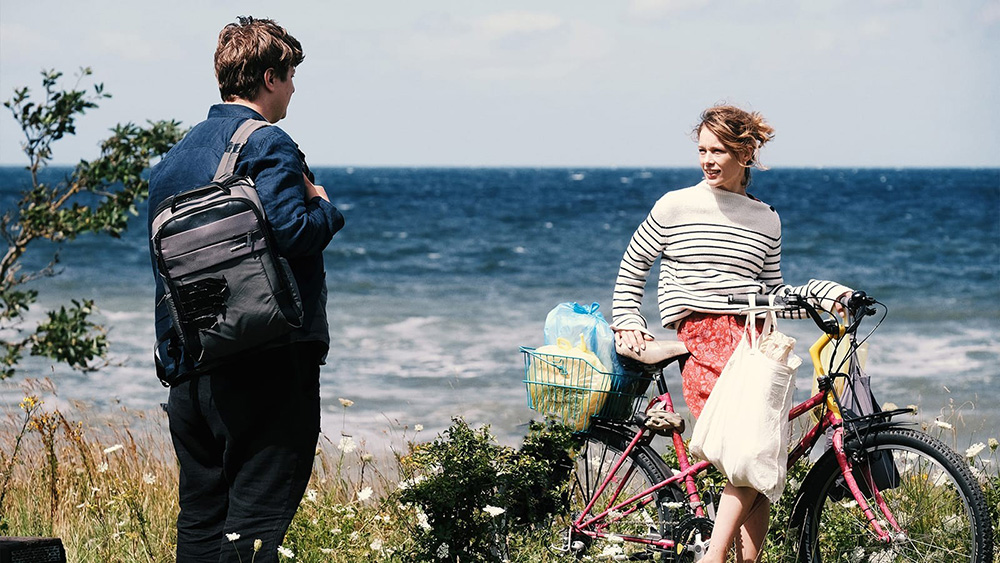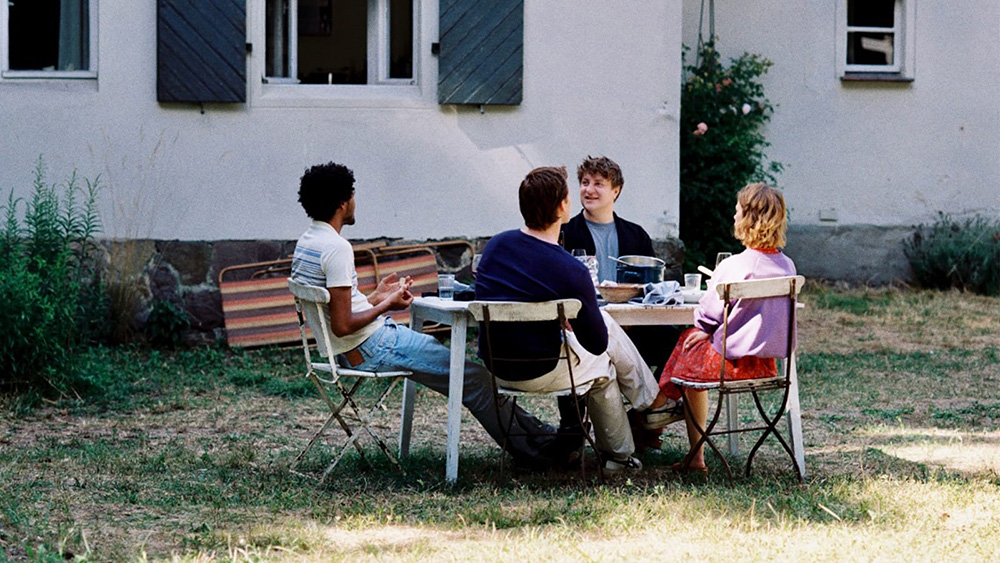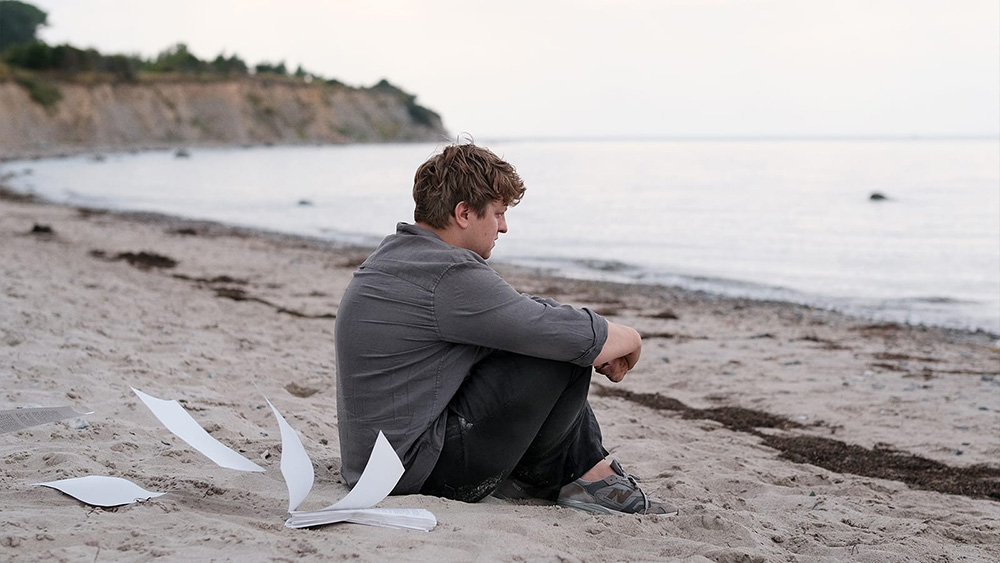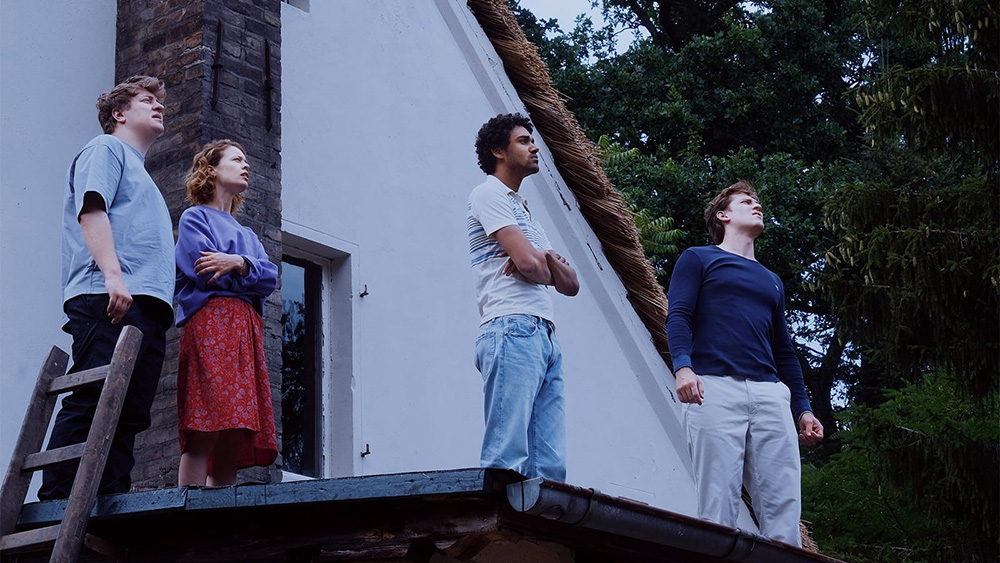For over 30 years, the German director Christian Petzold has been making “films in the cemetery of genre cinema.” Many of these riff off influential novels and films like Edgar Ulmer’s Detour, James McCain’s The Postman Always Rings Twice, and Herk Harvey’s Carnival of Souls, to address both the legacy of Germany’s ruined postwar period and how policies forged during this era continue to inform many of its political weaknesses. Such is the case in Transit (2018), his adaptation of Anna Seghers’s Holocaust novel of the same, which he displaced to modern times, creating a powerful corollary between the obstacles impeding Jews from leaving Europe during the rise of fascism in the 1930s and the plight of migrants seeking refuge in the EU today.
His latest film, Afire (2023), takes a more oblique approach toward present-day politics, revolving around the ongoing climate crisis. Inspired by American and French summer movies like David Robert Mitchell’s The Myth of the American Sleepover (2010) and Éric Rohmer’s The Green Ray (1986), Afire takes the form of a comedy foregrounding sex and leisure all the while a portentous wildfire looms in the background.

Nicolas Pedrero-Setzer: Around the time of your 2018 retrospective at Film at Lincoln Center you mentioned your approach to cinema was wrapped up in desire and haunted by Gilles Deleuze’s “mental image.” Is this still true?
Christian Petzold: Yes, this is true. Since 2000, I’ve made 15 or 16 movies. It’s always been important that I have rehearsals with the cast and crew three months before shooting begins. I gather the whole crew and I talk to them for four to six hours. But, it’s not like I’m Stalin. [laughs] I just want to tell them the history of the project we are all working on, how I had the first idea, what came to my mind, the research I did, how I found locations, and so on. I talk to them. That way everybody knows what my movie is about.
Then we watch two or three movies together, but it has nothing to do with the subject of our movie, it’s all about the morality of the movie and the position of the camera. The actors love it, to sit there in the screening room and watch a movie like Rumblefish [1983] by Coppola or Some Came Running [1958] by Vincent Minelli. On the third day, we get a bus and drive to all of the places we will shoot in two months. I show them each place. I say, “This is the house, this is the forest glade, this is the beach, this is the hospital.” By this point, the actors have heard the voices of one another, they have had a historical seminar about the movie, and they understand the reality from the locations. This is why I never have any problems with actors. I never have anyone go, “Oh, I don’t know who I am, I’m sorry.” Never. Because they have worked, because they have material.
When we shoot, we wake up at 8:30 because I had a long discussion with Isabelle Huppert at a film festival in Odessa where she said, “I never wake up before 8:00.” She’s right. There’s no reason to take people out of bed at 3 o’clock in the morning, at 5 o’clock, stuff them in a makeup van, and have them look like zombies all day. They can’t speak and they’re in a bad mood. Instead, we meet at 9 o’clock in the location we want to shoot in with no cameras, just one assistant with coffee and me. They take off their ordinary clothes, put on their costumes, and go through every decision we need to clear before we start shooting. For example, when you have a table and five people sitting around it, like in Afire, it raises big questions. It’s like when a group arrives at a restaurant. Who is sitting where?
NP: That’s an important decision.
CP: It’s a very hard decision and a very important decision because it tells the story of who wants to sit where. It is like choreography. Who is telling the story? Who is telling the story to whom? Who wants to hear the story? Who does not want to hear the story? Who is looking at one another? So many things are happening without body movement, just in looks. It's choreography, and you need time for choreography. But by 10 a.m. everything is done, and I make a phone call to have the rest of the crew come over. They’ve already had breakfast. The producer has already committed suicide because he’s called three times and asked, “Have they started?” and the assistant keeps answering, “No, they’ve done nothing,” and by 5 o’clock we’re done. This is fantastic. I think you can work like this, but I think producers and the industry need to see effort. They need to see sweat and tears, and they need to see actors bawling, saying, “I don’t understand what’s going on. I hate myself.”
NP: Why do you think that is?
CP: It’s just Protestant ethics. They think work has something to do with suffering, not with humor and fun.
NP: Isn’t that what Afire is about? The main character, Leon, is a product of Protestant ethics, and he denies himself leisure at the beach because he needs to work. Do you feel similarly when making movies: that your producers don’t think you’re working?
CP: I think I know everything about Protestant ethics because I was educated with that shit. Leon is a guy who never works, he’s totally deconstructed. In the beginning he never works while others do dishes, make the table, and sell ice cream. He’s lazy and fat but is always talking about work. I can see myself in him and I can also find my relief in the story of Afire.
NP: Where do you find the relief in Afire? In purging yourself of Leon by writing him out?
CP: I found relief the moment I wrote the story. Initially, I didn’t realize [that] Leon and I are very similar. I think he is an idiot, and I had a fear that nobody would like the idiot, but then I remembered all the comedies I have loved in life and how in all of these comedies there are so many idiots. The thing about the idiot is that you like him because you want to help him.
I know that Thomas Schubert is a fantastic actor because from the moment he started reading, during the first cold reading, Paula [Beer] started laughing. She wasn’t laughing at him; she was laughing at his work. Then he looked at her, and she looked at him, and I realized Paula knew that he knew that she had tried to help him. She was not falling in love with him; she wanted to help him. She knew she could show Leon the door to a better life.

NP: You’ve spoken about how the American and French summer movie opens doors to better lives for its protagonists, but complained about that not existing in German cinema. Do you have a theory as to why Germany doesn’t have this kind of summer movie?
CP: I have a theory that sounds so good that perhaps it could be true. I was in the Criterion Closet half an hour ago, and they showed me a movie they have on DVD: Menschen am Sonntag (People on Sunday). It was made by Edgar G. Ulmer, Robert Siodmak, and Billy Wilder. All of them are Germans and Austrians. The film came out in 1932. It’s a summer movie that takes place during one weekend featuring young people by the lake falling in love, and it’s filmed as if it’s free, as if the cameras are not heavy. There is a new idea of cinema that was realized later in Neorealism, the French Nouvelle Vague, or in the cinema of John Cassavettes, but you can feel it in People on Sunday in 1932. This is a summer movie, but half a year later all of these directors had to leave Germany and they came to Hollywood, where they created big parts of the film noir.
Detour [1945]. The Killers [1946]. These are hard-boiled and melodramatic movies, not comedies. These movies tell us a story about exile. They tell us that German culture lost something because it was totally destroyed from 1932 to ’45. German culture never came back, and this movie, People on Sunday, is the summer movie we’ve lost in Germany.
Summer movies are not movies where there are beaches; they are movies that represent a specific time in people’s lives. This is a time when the world is a promise; sometimes you can realize a promise, but sometimes you miss it. There’s that Stephen King novel Stand By Me, which is also a movie featuring the fantastic River Phoenix. It is a melancholy look back at a summer when friendships ended and started, careers ended and began, love grows and goes missing. Summer is always an act of remembrance that looks back at things that one missed or could have done better. This is summer, as seen in American movies like Stand By Me or The Myth of the American Sleepover, and in France with the films of Éric Rohmer, Jacques Rivette, Guillaume Brac, and so on.
We don’t have this in Germany. In our summer movies the parents are always there. Summer movies in Germany are like this: The student is coming home because of summer. He studies in Berlin and he is returning to a small village. He says, “I’m a homosexual.” His parents get angry and have a crisis. Their son gets depressed, meets a girl and finds his inner self, all while at his parents’ home. This is boring!
NP: Are you saying freedom was replaced by boredom in Germany?
CP: Yes, that’s right. This is my theory. With the extraction of People on Sunday, we lost our freedom and summer left Germany for a long, long time.
NP: Many of your films deal with Germany’s loss of culture in the aftermath of World War II, but Afire engages with the present. We’ve had our own red skies here in New York, and it’s my understanding wildfires continue to spread around Berlin. What made you shift your attention to the present climate crisis?
CP: When my children were very young I had to read them books so they’d fall asleep. There was one book I hated. It was about a polar bear, po-lar bear, Paula Beer. [laughs] Anyhow, it was about a polar bear named Lars. It's a very famous story in Germany. I hated it, but I had to read it to them. I’d also try and teach them a few things. There’s a word in German, totenstille, that means “death silence.” In Germany, we have silence and death silence. Stille. Totenstille.
My kids would ask me, what is this totenstille? I’d say to them, when there is silence nobody is speaking but you can hear noise in the distance. With death silence, there is nothing. It is total nihilism. My children didn’t understand this because they were two years old., they would simply fall asleep listening to Lars’s story.
Many years later, I went to Turkey with my wife, and there was a forest as big as New York that was totally burnt out. I’d never seen a forest burnt out before. As I was driving through this dead forest with my kids we decided to get out of the car and seeing millions of black trees around us, the kids and I experienced death silence for the first time. There was no wind, no birds, no insects, nothing. This was a shock to me.
I started thinking about the Germans, their forests and their glades. In Germany, glades are sites of myth and legends—the cabin in the woods, nymphs in the forests, Siegfried in Nibelungenlied, Shakespeare’s Midsummer Night's Dream. For hundreds of years, the German glade has been the space for telling stories. When you have seen and felt a forest fire, you know the place for telling stories is about to be destroyed. My children, who are 27 and 23, feel as though they no longer have summers; they feel this could be the end. This is something totally different that undermines older stories about summer. This means you can no longer find an identity because the forest is in flames, the lake has dried out, there is no more water, there is pollution in the air, there is poison in the sea. . .
NP: There is no room for stories.
CP: This is the story of Afire. It’s not a political story. I never want to make political movies. I am interested in things that are in crisis, like what is currently happening to stories.
NP: Why don’t you want to make explicitly political films?
CP: You know, in Germany we have many journalists who want to make movies or write novels and all these projects are real shit. It’s because they have an idea and they only translate this idea to the medium they’re working with, leaving readers and audiences to decode the idea back from the jumbled story. The story ceases to be complex because there is a mastermind with his ideas behind it, but no story.
A story must come out organically for me. When I see a movie like The Searchers [1956] by John Ford, it’s not a movie about civil war or racism, but there is racism and the Civil War alongside the story of the lonely warrior who cannot fight back against changes in civilization. The Deer Hunter [1978] is not a movie about Vietnam. It’s such a complex movie that it’s also a movie about the death of industrial work in Pennsylvania steel mills and how the energy of young men without factory jobs is done away with through the war. Cimino did not set out to make a book about this, but these ideas come out naturally from his material.
While making Afire, the forest fire and the ignorance these young people held toward it wasn’t something I wanted to condemn, as it was something that let them survive. If we were thinking all day about forest fires and the shitty capitalist pollution of the world, we wouldn't have any summers left with dance and sexuality. This is not ignorance, this is survival.
NP: In previous interviews, you’ve mentioned you are working on an elemental trilogy that similarly deals with the climate crisis. Is your environmental anxiety something that’s inspiring a new story?
CP: I thought the next story could also be something about elements. Now, my idea for the next movie, or movies, has to do with when our social groups—unions, families, the church—are destroyed. When society is ruined, when families are ruined, there is a desire to find a new family or a group of people that gives you the feeling that you’re not alone and you have a place in the world. This is something I am interested in, to make movies about this desire.
My next movie is about a ruined family who finds a new daughter. It’s a little bit of a horror story with Paula Beer as the daughter. She hasn’t read the script yet because it’s not ready yet, and she hasn’t agreed yet because she said, “First I want to read the script before I make a contract.” I like that about Paula Beer, that she is a bit like Nadja in Afire; she’s on her own and independent.

NP: Afire is the third movie you’ve collaborated with Paula Beer on. How did you build your relationship with her?
CP: François Ozon and I have the same casting agent. I met him because I helped him one day with some German dialogues. He showed me a photo of a young actress and asked me, “What do you think about her?” I told him, “I knew her as a child in an old movie, but I haven’t thought about her since.” But he assured me she was great and allowed me to watch his casting tapes. I saw them, I was totally impressed, and I invited her to join Transit.
NP: I’ve noticed that in many of your movies like Das Warme Geld (1992), Jerichow (2008), and now Afire, music makes strong appearances in a very sudden and potent manner. What are your thoughts on the role music should play in film?
CP: One year ago I met with the editor of all my movies, Bettina Böhler. She was sitting with another director on a lunch break, and I asked them if I could join them at their table. The director was saying, “We had a fantastic moment in the editing booth. We took the song from The Carpenters, [sings] ‘Why do birds suddenly . . . ’ put it in the scene, and it’s great.’” I didn’t want to talk to him about this because he was so enthusiastic, and I didn’t want to disappoint him. The thing is you can take that song, put it anywhere and it’ll make whatever it’s paired with fantastic for a moment. Sometimes music is not good for a movie because it’s like a parasite, like good salt on bad meat. Everything works with music. I love music, it’s strong, and because of that reason I try not to use it very much.
NP: It’s placed very delicately and much like your politics, arises organically from the story.
CP: But it could be that in the next movie I make I use more music. It’s a dream of mine to also sit there on a lunch break and say to someone, “Hey, we used The Carpenters, it’s great!” It means you don’t have to work so hard. You just throw €50 thousand for one song and it’s done. Your producer gives you two thumbs up, says, “It’s great, it’s great.”
You know, I’m a fan of the Simpsons. The Simpsons has so many fantastic ideas you don’t need ideas anymore. In The Simpsons Movie [2007], Homer is on his way to Alaska because he’s poisoned a lake. There, he opens the window, and birds start coming in as he sings, “Why do birds suddenly appear everytime . . . ” and then snow falls on him and the song ends. This is fantastic. You don’t need this kind of idea anymore because The Simpsons is already doing it, and Matt Groening is a very intelligent person.
Afire is now playing at Film at Lincoln Center and IFC Center.



